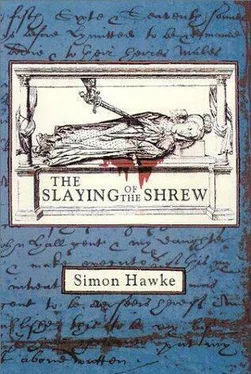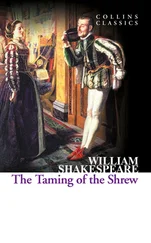Simon Hawke - The Slaying Of The Shrew
Здесь есть возможность читать онлайн «Simon Hawke - The Slaying Of The Shrew» весь текст электронной книги совершенно бесплатно (целиком полную версию без сокращений). В некоторых случаях можно слушать аудио, скачать через торрент в формате fb2 и присутствует краткое содержание. Жанр: Исторический детектив, на английском языке. Описание произведения, (предисловие) а так же отзывы посетителей доступны на портале библиотеки ЛибКат.
- Название:The Slaying Of The Shrew
- Автор:
- Жанр:
- Год:неизвестен
- ISBN:нет данных
- Рейтинг книги:5 / 5. Голосов: 1
-
Избранное:Добавить в избранное
- Отзывы:
-
Ваша оценка:
- 100
- 1
- 2
- 3
- 4
- 5
The Slaying Of The Shrew: краткое содержание, описание и аннотация
Предлагаем к чтению аннотацию, описание, краткое содержание или предисловие (зависит от того, что написал сам автор книги «The Slaying Of The Shrew»). Если вы не нашли необходимую информацию о книге — напишите в комментариях, мы постараемся отыскать её.
The Slaying Of The Shrew — читать онлайн бесплатно полную книгу (весь текст) целиком
Ниже представлен текст книги, разбитый по страницам. Система сохранения места последней прочитанной страницы, позволяет с удобством читать онлайн бесплатно книгу «The Slaying Of The Shrew», без необходимости каждый раз заново искать на чём Вы остановились. Поставьте закладку, и сможете в любой момент перейти на страницу, на которой закончили чтение.
Интервал:
Закладка:
“Well, I suppose that woke him up, eh, Ian?” he said. He held out the drumstick. “D’you fancy a bite?”
He did not have very much time to eat. Middleton came down almost at once, having paused only long enough to pull on a pair of boots and throw a cloak over his dressing gown. He barked out sharp orders to Humphrey, calling for torches and men, then put on his hat and turned a baleful eye on Shakespeare.
“Young man, you had best be telling me the truth, for if this is your gruesome idea of a prank, then you shall answer to me! I shall have you whipped until your eyes bleed. Now come with me!”
“I should answer quite well to a whipping,” Shakespeare mumbled, taking another quick swallow of wine before following his host.
Phillipe Dubois worked his way through the crowd to Shakespeare’s side. “Prithee, mon ami, do you mean to tell me that Mademoiselle Catherine is not truly dead?” he asked, as they went back outside, herded along by the press of people behind them.
“No, milord, I had meant to tell Master Middleton that Cadierine is not truly dead,” Shakespeare replied. “Strewth, I had not meant to tell you anything.”
“You have great cheek for a vagabond,” said Dubois, somewhat stiffly.
“And you lisp and wear strange suits.”
“I say, small wonder you players have such a scandalous and lowly reputation,” Ian said, as they left Dubois gaping with astonishment behind them. “You really are insufferably rude.”
“And you really are an amazing prig for a mere coachman, Ian.”
“I happen to be a liveried servant to a gentleman!”
“You are a glorified bootblack, Ian, so go stuff your hubris. Or you can actually be useful and go find my friend, Tuck Smythe, and let him know what has transpired, for your master seems intent upon marching us all into the dripping wood when we should all be drinking sensibly inside. I am beginning to envy Catherine. At least she has had an opportunity to lie down for a while.”
“A word with you, sir, if I may?” Hughe Camden called as he hurried to catch up with them. Ian the coachman stopped and fell behind as Camden took his place at Shakespeare’s side.
“And lo, another suitor. The kites begin to flock,” mumbled Shakespeare to himself.
“I beg your pardon?” Camden said.
“And you shall have it, sir. I am feeling positively popish tonight. Tell me your sin and I shall grant you absolution.” “I see you are impertinent.”
“Impertinent and insufferable, as well. Add intemperate and you can compass me with alliteration.” “I believe you are drunk, sir.”
“Not yet, but on such a night as this, ‘tis a course well worth pursuing. How may I serve you, sir? Something to do with the lately lamented Lady Catherine, no doubt?”
“I was listening when you spoke just now,” said Camden, as they continued down the path in the wake of Middleton and his torch-bearers. “You said something about Catherine planning this astonishing deception so that she might run off with a lover?”
“Aye, quite so.”
“Sir, I must say that I find this tale very hard to credit. Tis a harsh thing to defame the dead. I cannot believe that she would have done anything like what you propose. I have heard that Catherine could be somewhat shrewish on occasion, but at heart, she was a good woman.”
“Well, we might have a good woman born before every blazing star or at an earthquake,” Shakespeare said, “but I would not look for such a singular event with any greater frequency.”
“You have, it seems, a rather bilious and spiteful view of women, sir.”
“I am a married man, sir. My view is unobstructed.” “Who is this lover you allege Catherine of having?” “Ah, there I cannot answer you, for I have no knowledge of his name.”
“How, then, do you know that he exists? Or do you merely surmise?”
“Surmise, allege, tales hard to credit… I gather you must be the lawyer.”
“I have the honor to attend the Inns of Court. My name is Hughe Camden. You may know my father.”
“May I? Well then, so I shall, if you decide to introduce him. In the meantime, learned sir, know that whilst I cannot bear witness to the alleged lover’s name, I can vouchsafe his existence by the testimony of the lady herself, who spoke of running off with him.”
“You have heard her say this?”
“Not with mine own ears, but earlier today, I spoke with one who did hear the lady say so.”
“Hearsay, sir. ‘Twas a lie, I’ll warrant.”
Shakespeare shrugged. “Well, we shall find out soon enough.”
“I am not at all sure what you have to gain by raising all this fuss,” said Camden, looking at him as if trying to gauge his motives.
“I have nothing at all to gain, sir,” Shakespeare said, “and only time to lose. You, on the other hand, would stand to gain a great deal more, I should think, if Catherine were truly dead. That would increase her sister’s worth considerably, would it not?”
“I do not care for your tone, sir.”
“I do not much care for yours, either. I have played penny whis-des that have made less grating noise.”
“What is your name, sir?” asked Camden, stiffly.
“Marlowe,” Shakespeare said. “Christopher Marlowe, at your service.”
“Marlowe.” Camden nodded. “I shall make a point to remember that name.”
“Suit yourself. I have already forgotten yours.”
Camden fell behind as Shakespeare increased his stride and hurried on ahead. He had almost caught up to Middleton, at the head of the procession, when yet another of Blanche’s suitors came up beside him and introduced himself.
“Sir, my name is Andrew Braithwaite. Might I have a word with you?”
“Have three, as you are the third to ask.”
“Indeed, I did see Dubois and Camden speaking with you just now. Did they say anything of interest?”
“No, not really. I rather hope you shall do better.”
Braithwaite smiled. “I fear, then, that you are doomed to disappointment. I doubt I can be much more interesting, for I am neither a great wit nor a learned scholar.”
“Then you at least appear to be an honest man, which in itself makes you more interesting. A plain bird would stand out ‘mongst all this plummage.”
Braithwaite chuckled. “You do not care much for this company, I see. And yet, here where each man competes with every other, you have seized everyone’s attention. You stand centerstage, and yet seem to regard it as an imposition.”
“It amuses you?” asked Shakespeare, glancing at Braithwaite to see if he was being mocked. But it seemed that he was not.
“If I can say so without giving offense, aye, it does amuse me. But the amusement, I hasten to add, is not at your expense.”
“I am not offended then.”
“Good.”
Shakespeare glanced at him with interest. “Most people, especially in this vaunted company, would not concern themselves overmuch about giving offense to a mere player.”
“Well, I try not to be careless about whom I may offend,” Braithwaite replied. “That way, I can husband my offenses for those who most deserve them.”
“Well said.”
“Thank you.”
“You are welcome, sir. What would you have of me?”
“Why, nothing in particular,” Braithwaite replied.
“What, not even after my singular announcement at the wake?”
“ ‘Twas, indeed, singular,” Braithwaite said. “Quite astonishing, in fact.”
“And in light of it, you have nothing more you wish to ask?”
“Not at present. I suppose if what you said proves to be the truth… well, frankly, I have absolutely no idea what will occasion then. It should prove quite fascinating. But if what you said turns out to be false, I have a rather better idea of what will occur. Godfrey Middleton will have you whipped for your impertinence and then see you thrown off his estate. That is, assuming you survive the whipping.”
Читать дальшеИнтервал:
Закладка:
Похожие книги на «The Slaying Of The Shrew»
Представляем Вашему вниманию похожие книги на «The Slaying Of The Shrew» списком для выбора. Мы отобрали схожую по названию и смыслу литературу в надежде предоставить читателям больше вариантов отыскать новые, интересные, ещё непрочитанные произведения.
Обсуждение, отзывы о книге «The Slaying Of The Shrew» и просто собственные мнения читателей. Оставьте ваши комментарии, напишите, что Вы думаете о произведении, его смысле или главных героях. Укажите что конкретно понравилось, а что нет, и почему Вы так считаете.












